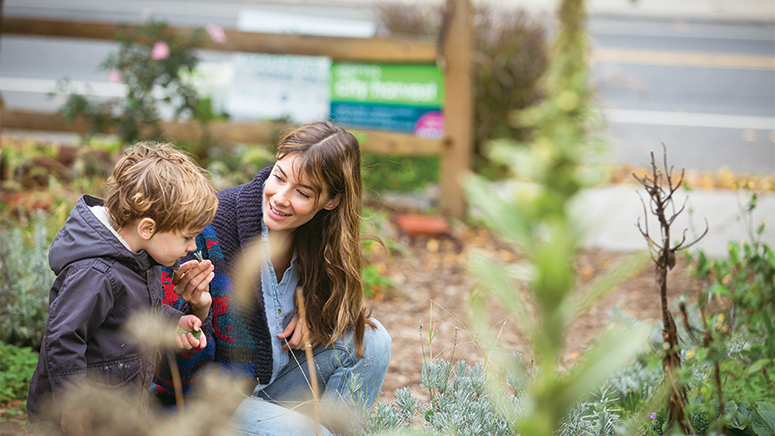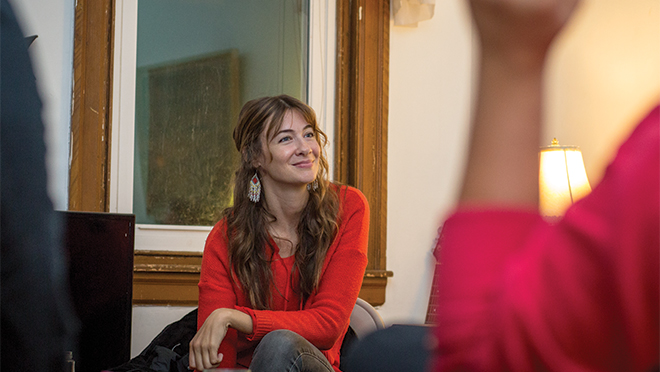Rewriting our script
Discovering abundance in our story

I first recognized my complicated feelings about money several years ago during a monthly Cell Leader Training at my church, Circle of Hope in Philadelphia. The pastors asked us to write our total consumer and school loan debt. I don’t know what I thought would happen next, but when they asked us to pass our papers down the row, I froze. The idea of five people in my row seeing my total debt made me want to disappear. I concluded that I had to make the paper disappear somehow – to “drop” it or eat it. Fortunately, the person beside me handed me their paper face down (why didn’t I think of that?), so I did the same. My reaction came from a combination of feeling exposed, isolated and stuck. I remember wondering if that was shame.
Photography by Jenna Stamm.
I finally realized how our schedules and lack of financial consistency took a toll on the quality – and integrity – of our lives when our son was born and I took five months off from work. So I chose to be more selective about modeling jobs, which gave me a more consistent schedule, and Steven and I resolved to get some financial planning guidance.
We didn’t know who to call, but I remembered an amazing seminar that Randy Nyce, Church Relations Representative at Everence, led at my church a few years ago. Inspired by Walter Brueggemann’s book, Journey to the Common Good, Randy compared the Bible’s message that God is enough with the myth perpetuated by our culture that we never have enough. He revealed how credit card debt produces dependency and poverty, and asserted that the church’s vocation is to help people realize the kingdom of abundance proclaimed by Jesus.
Even though the seminar focused on money, I remember feeling so inspired and hopeful – a markedly different feeling than my experience in the same room years ago. I didn’t feel so alone after hearing about how predatory the debt industry is and how pervasive the human tendency for a scarcity mindset is, even throughout the Bible. Also, by that point, I had been well-steeped in what Bruegemann suggests is the antidote to the scarcity mindset: neighborhood. One of Circle of Hope’s greatest gifts to the world is how we believe neighborhood and neighborliness are fundamental to a life of genuine, transformative faith. So before any formal financial planning, I already began to shape an alternative narrative for our lives.

We experienced healing and felt recreated after setting aside time to talk honestly about our past and current finances in a safe place. Our advisor’s nonjudgmental demeanor helped us open up. We discovered a more nuanced version of our financial history, with its two-steps-forwardand- one-step-back pacing, rather than the all-bad, black hole we had expected to peer into. It also surprised us that the experience unlocked some of our deeply held longings and sparked conversations about who we are, what we want, and how we can keep learning to trust in God as we rewrite our story into one about abundance.
Importantly, we emerged from our meetings with a working budget for the first time in our marriage. At our advisor’s suggestion, we designated part of the big white board in our kitchen to our food and household budget, and put the starting amount in the top right corner. Every time one of us spends money on groceries or other household needs, we deduct it from the amount at the top so that we keep track of how much money remains for the month.
I actually felt a little giddy the first time I went grocery shopping, knowing that I would have to write the total spent on that white board. I used to connect “budget” with “limitation,” but once we created the budget, I quickly realized that not having a budget had been overwhelming. The boundaries of the budget freed me to think about what our family liked and needed.
Vanessa Caruso meets regularly with her Cell, or small group, from her church, Circle of Hope in Philadelphia.
There are still aspects of our finances that need work. But a year after making the call to Everence, I am amazed at how far we’ve come just by taking one step at a time.
And that reminds me of my favorite part of Randy’s seminar a couple years ago. He reassured us that the journey to shift our mindsets from scarcity to abundance isn’t a one-way journey; we must travel the road again and again. “Our walk is always more complicated than our talk,” he acknowledged. “But keep talking! It influences the walk. And keep walking.”
We have a lot more work to do, but we are at least talking and walking with a more hopeful script in hand. And with a white board budget, which has come to symbolize – to our surprise – possibility rather than failure!
Vanessa, Steve, and their son, Leo, live in the Kensington neighborhood of Philadelphia and are part of Circle of Hope.
Story originally published in Spring 2016.
